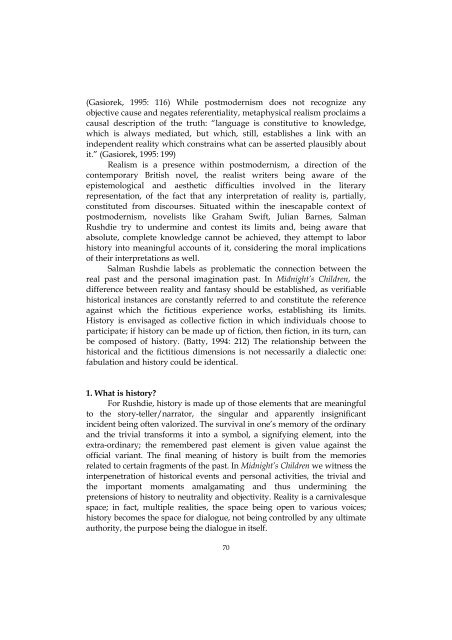translation studies. retrospective and prospective views
translation studies. retrospective and prospective views
translation studies. retrospective and prospective views
You also want an ePaper? Increase the reach of your titles
YUMPU automatically turns print PDFs into web optimized ePapers that Google loves.
(Gasiorek, 1995: 116) While postmodernism does not recognize any<br />
objective cause <strong>and</strong> negates referentiality, metaphysical realism proclaims a<br />
causal description of the truth: “language is constitutive to knowledge,<br />
which is always mediated, but which, still, establishes a link with an<br />
independent reality which constrains what can be asserted plausibly about<br />
it.” (Gasiorek, 1995: 199)<br />
Realism is a presence within postmodernism, a direction of the<br />
contemporary British novel, the realist writers being aware of the<br />
epistemological <strong>and</strong> aesthetic difficulties involved in the literary<br />
representation, of the fact that any interpretation of reality is, partially,<br />
constituted from discourses. Situated within the inescapable context of<br />
postmodernism, novelists like Graham Swift, Julian Barnes, Salman<br />
Rushdie try to undermine <strong>and</strong> contest its limits <strong>and</strong>, being aware that<br />
absolute, complete knowledge cannot be achieved, they attempt to labor<br />
history into meaningful accounts of it, considering the moral implications<br />
of their interpretations as well.<br />
Salman Rushdie labels as problematic the connection between the<br />
real past <strong>and</strong> the personal imagination past. In Midnight’s Children, the<br />
difference between reality <strong>and</strong> fantasy should be established, as verifiable<br />
historical instances are constantly referred to <strong>and</strong> constitute the reference<br />
against which the fictitious experience works, establishing its limits.<br />
History is envisaged as collective fiction in which individuals choose to<br />
participate; if history can be made up of fiction, then fiction, in its turn, can<br />
be composed of history. (Batty, 1994: 212) The relationship between the<br />
historical <strong>and</strong> the fictitious dimensions is not necessarily a dialectic one:<br />
fabulation <strong>and</strong> history could be identical.<br />
1. What is history?<br />
For Rushdie, history is made up of those elements that are meaningful<br />
to the story-teller/narrator, the singular <strong>and</strong> apparently insignificant<br />
incident being often valorized. The survival in one’s memory of the ordinary<br />
<strong>and</strong> the trivial transforms it into a symbol, a signifying element, into the<br />
extra-ordinary; the remembered past element is given value against the<br />
official variant. The final meaning of history is built from the memories<br />
related to certain fragments of the past. In Midnight’s Children we witness the<br />
interpenetration of historical events <strong>and</strong> personal activities, the trivial <strong>and</strong><br />
the important moments amalgamating <strong>and</strong> thus undermining the<br />
pretensions of history to neutrality <strong>and</strong> objectivity. Reality is a carnivalesque<br />
space; in fact, multiple realities, the space being open to various voices;<br />
history becomes the space for dialogue, not being controlled by any ultimate<br />
authority, the purpose being the dialogue in itself.<br />
70












